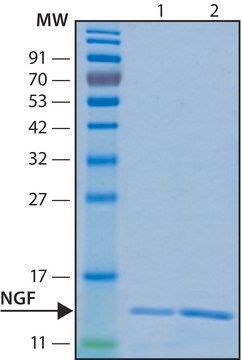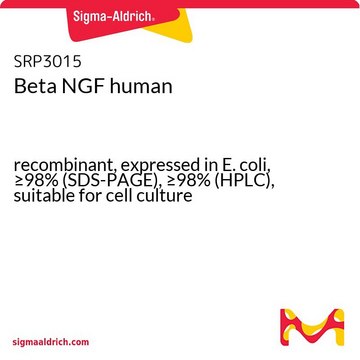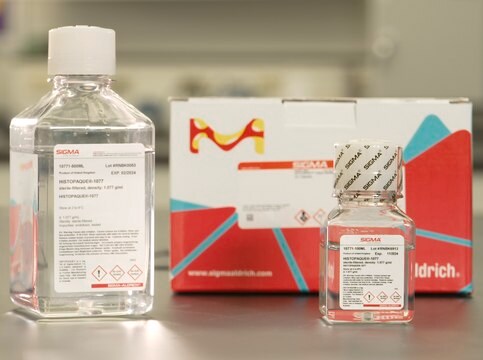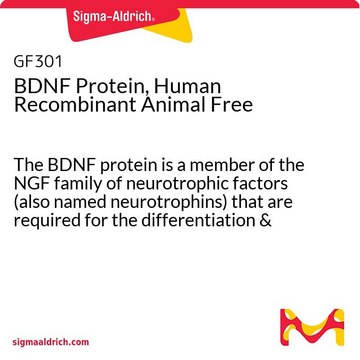Wszystkie zdjęcia(1)
Kluczowe dokumenty
N0513
Nerve Growth Factor-7S from murine submaxillary gland
lyophilized powder, suitable for cell culture
Synonim(y):
NGF-7S
Zaloguj sięWyświetlanie cen organizacyjnych i kontraktowych
About This Item
Polecane produkty
Nazwa produktu
Nerve Growth Factor-7S from murine submaxillary gland, NGF-7S, lyophilized powder, suitable for cell culture
pochodzenie biologiczne
mouse
Poziom jakości
Formularz
lyophilized powder
siła działania
2-250 ng/mL ED50/EC50
jakość
endotoxin tested
masa cząsteczkowa
protein 130 kDa
opakowanie
pkg of 0.1 mg
metody
cell culture | mammalian: suitable
zanieczyszczenia
≤10
kolor
white
numer dostępu UniProt
temp. przechowywania
−20°C
informacje o genach
mouse ... Ngf(18049)
Opis ogólny
Nerve growth factor (NGF) is a dimer of 118-residue polypeptide chains linked non-covalently. Both these polypeptides contain three intramolecular disulphide bridges. It forms the prototype of the neurotrophin growth factor family. In male mouse submandibular salivary gland, NGF is present in high amounts, and is present as a high molecular weight complex called nerve growth factor-7S (NGF-7S). NGF-7S is an α2β2γ2 complex, where β2-NGF is the active neurotrophin, and is linked to the dimers of the glandular kallikrein serine proteinases members, α-NGF and γ-NGF.
Zastosowanie
Nerve Growth Factor-7S (NGF-7S) from murine submaxillary gland has been used for the treatment of following cells to induce neuronal differentiation-
- PC12
- Dorsal root ganglia (DRG) obtained from chick embryos of either sex (Gallus gallus)
Działania biochem./fizjol.
Nerve growth factor (NGF) is a neurotrophin, which facilitates the differentiation and survival of specific subtypes of neurons of central nervous system and peripheral nervous system. However, nerve growth factor-7S (NGF-7S) lacks any neurotrophic activity as most part of β-NGF subunit is buried within the NGF-7S complex.
Postać fizyczna
Lyophilized from 0.2 μm filtered solution in 25 mM sodium phosphate, pH 7.0.
Uwaga dotycząca przygotowania
Nerve growth factor-7S (NGF-7S) is isolated from male mouse submaxillary glands using a modification of the method of Varon, et al.
Komentarz do analizy
The biological activity is measured using a 3-day MTT assay.
Ta strona może zawierać tekst przetłumaczony maszynowo.
Kod klasy składowania
11 - Combustible Solids
Klasa zagrożenia wodnego (WGK)
WGK 3
Temperatura zapłonu (°F)
Not applicable
Temperatura zapłonu (°C)
Not applicable
Środki ochrony indywidualnej
Eyeshields, Gloves, type N95 (US)
Wybierz jedną z najnowszych wersji:
Masz już ten produkt?
Dokumenty związane z niedawno zakupionymi produktami zostały zamieszczone w Bibliotece dokumentów.
Klienci oglądali również te produkty
Kun-Shan Huang et al.
Evidence-based complementary and alternative medicine : eCAM, 2011, 109809-109809 (2009-08-19)
The present study provides in vitro and in vivo evaluation of Paeoniae alba Radix (PR) on peripheral nerve regeneration. In the in vitro study, we found the PR caused a marked enhancement of the nerve growth factor-mediated neurite outgrowth from
Hsien-Tung Chen et al.
Journal of biomedical materials research. Part B, Applied biomaterials, 84(1), 256-262 (2007-05-22)
This study provides in vitro and in vivo evaluation of rat serum metabolites of the Pueraria lobata (SMP) on peripheral nerve regeneration. In the in vitro study, we found that the SMP caused a marked enhancement of the nerve growth
B Bax et al.
Structure (London, England : 1993), 5(10), 1275-1285 (1997-11-14)
Nerve growth factor (NGF) is a neurotrophic factor that promotes the differentiation and survival of certain populations of neurons in the central and peripheral nervous systems. 7S NGF is an alpha 2 beta 2 gamma 2 complex in which the
The isolation of the mouse nerve growth factor protein in a high molecular weight form.
S Varon et al.
Biochemistry, 6(7), 2202-2209 (1967-07-01)
Claudia Guldimann et al.
International journal of experimental pathology, 93(4), 259-268 (2012-07-19)
Central nervous system (CNS) infections in ruminant livestock, such as listeriosis, are of major concern for veterinary and public health. To date, no host-specific in vitro models for ruminant CNS infections are available. Here, we established and evaluated the suitability
Nasz zespół naukowców ma doświadczenie we wszystkich obszarach badań, w tym w naukach przyrodniczych, materiałoznawstwie, syntezie chemicznej, chromatografii, analityce i wielu innych dziedzinach.
Skontaktuj się z zespołem ds. pomocy technicznej









